|
|
|
Sort Order |
|
|
|
Items / Page
|
|
|
|
|
|
|
| Srl | Item |
| 1 |
ID:
104024
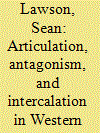

|
|
|
|
|
| Publication |
2011.
|
| Summary/Abstract |
This article provides a discursive grounding for understanding the construction of military imaginaries by adding the concepts of 'antagonism' and 'intercalation' to articulation theory. By examining the cases of industrial-mechanized warfare theory and network-centric warfare theory through the lens of this expanded articulation theory, it is argued that military imaginaries often serve to define and link conceptions of science, technology, society, economy, war, and military organization, thought, and practice into a unified image of the larger security environment - that is, the military imaginary. Military imaginaries often share a common narrative structure that privileges co-periodized change among the elements of the articulation, resulting in the phenomenon of 'antagonism' serving as a generic threat used to justify military modernization and even the use of force.
|
|
|
|
|
|
|
|
|
|
|
|
|
|
|
|
| 2 |
ID:
104022
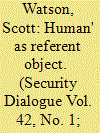

|
|
|
|
|
| Publication |
2011.
|
| Summary/Abstract |
Humanitarianism rivals security in its ability to legitimize emergency measures, and has also proven to be as ambiguous and open to abuse. In this article, humanitarianism is reconceptualized as a sector of securitization, like state and societal securitization, meaning that it is a structured field of practice that draws on existing discourses and institutions to enable the implementation of emergency measures. This reconceptualization contributes to the theory of securitization by expanding its applicability beyond states and societies to humans as referent objects, but also by challenging the Copenhagen School's conceptualization of normality/exceptionality at the domestic and international levels. Drawing on the humanitarian securitization of the 2004 Indian Ocean tsunami, the article demonstrates how the structured security field of humanitarianism privileges particular actors in speaking to human insecurity, and how the humanitarian discourse reifies and reinforces a monolithic form of human identity. The article draws attention to the process of representing developments as humanitarian emergencies and uses the framework of securitization to critically examine the discourses, practices and agents of humanitarianism.
|
|
|
|
|
|
|
|
|
|
|
|
|
|
|
|
| 3 |
ID:
104023
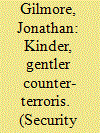

|
|
|
|
|
| Publication |
2011.
|
| Summary/Abstract |
he current US counterinsurgency approach, introduced in 2006, has been highlighted as representing a significant shift in the US military's approach to operations in Iraq and Afghanistan. Restraint in the use of force, a focus on development projects and increased awareness of local cultures might be interpreted as signalling the emergence of a more reflective and empathetic US military, with greater acceptance of human security principles. This article contests such an interpretation, arguing that US counterinsurgency contains a range of characteristics that render it an unsuitable tool for addressing the underlying social and political problems of Iraq or Afghanistan, as well as an inappropriate platform for the realization of human security principles. Counterinsurgency retains a significant role for high-impact war-fighting, remains firmly embedded within the narrative of the War on Terror, and is likely to lead to the disempowerment of local populations. Taken together, these interlinked characteristics make the US counterinsurgency model an unlikely vehicle for the development of a long-term positive peace in the societies within which it is being applied and risks seriously compromising the credibility of future attempts to help protect the security and well-being of individuals and groups beyond one's own national borders.
|
|
|
|
|
|
|
|
|
|
|
|
|
|
|
|
| 4 |
ID:
104028
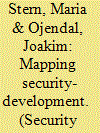

|
|
|
|
|
| Publication |
2011.
|
| Summary/Abstract |
The critical and considered response by Simon Reid-Henry (2011) reinforces our sense that the widespread attention being given to the 'security-development nexus' in the realm of policy warrants careful and critical scrutiny. Perhaps most significantly, Reid-Henry's review article draws attention to the need to engage in the difficult - and often overlooked - questions of methodology: how can we creatively study the different ways in which the 'nexus' is being practised, negotiated and resisted in distinct sites - and to what effect? His comments therefore add much to our collective (yet necessarily disparate) efforts to develop an array of creative methodologies for the study of the 'nexus'. Continuing the spirit of constructive critique, we engage with some of his main lines of argument. It is vital, we believe, to remember that there are many ways of exploring the politics of security-development, each requiring different road maps. Furthermore, as Véronique Pin-Fat reminds us, even the astute and committed pursuance of any given map may blind us to 'finding' what we are looking for.
|
|
|
|
|
|
|
|
|
|
|
|
|
|
|
|
| 5 |
ID:
104025
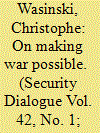

|
|
|
|
|
| Publication |
2011.
|
| Summary/Abstract |
The purpose of this article is to expose the existence of a recurring military grand narrative in the modern state-centric world. This narrative rests on techniques for codifying military discipline that appeared after the Middle Ages. It was then framed and diffused intertextually in classical military treatises thanks to the rediscovery of certain developments and concepts in the fields of geometry and perspective. According to the rules of this narrative, military actions are mostly described by mentioning the location and movements of (friendly or enemy) units deployed on a given terrain. This produced a geographical representation of war that is still largely relied upon by soldiers in contemporary armies (it will especially be found in current computerized systems available in contemporary military headquarters). The consequences of this narrative are manifold: (1) it participated in and assisted the reification and dehumanization of individuals as soldiers; (2) it acts as a rhetorical tool that rationalizes and naturalizes warfare; (3) and it strongly contributes to definitions of what war is in the modern state-centric world. In this way, it makes war possible.
|
|
|
|
|
|
|
|
|
|
|
|
|
|
|
|
| 6 |
ID:
104027


|
|
|
|
|
| Publication |
2011.
|
| Summary/Abstract |
As Maria Stern and Joakim Öjendal (2010) rightly point out, the security-development nexus 'matters'. If security and development are today more closely entwined than ever before - 'two sides of a coin', according to Beall and Goodfellow (2006: 52; see also Stewart, 2004) - their conjuncture is not unproblematic. Certainly, there is no doubt that the 'nexus' has its own discursive reality and that the felt need of the international community to pursue development and security policies alongside one another is shaping practice in this regard (a trend that is often taken to be something quintessentially new; however, for a useful argument against such presumed novelty, see Buur et al., 2007a; see also Cooper, 2006). Establishing quite what sort of meanings actors and scholars are attributing to the nexus, therefore, is a task of some importance. It was the explicit aim of the editorial essay in a recent special issue of this journal on 'the Security-Development Nexus Revisited' and the implicit task of the other contributory essays to the same issue. 1 The dissection by the editors, Stern and Öjendal, of the 'infinite' meanings that can be attributed to the security-development nexus helps reveal (and develop) what Chandler (2007) has elsewhere argued: that the nexus is in effect a hollow signifier capable of carrying any number of meanings, and that this capacity is maintained through its (paradoxically) attaining the veneer of a stable and uncontested notion. Such dissection is an undoubtedly important task, from which follows what Foucault would call both critical and effective possibilities ( Dean, 1994).
|
|
|
|
|
|
|
|
|
|
|
|
|
|
|
|
| 7 |
ID:
104026


|
|
|
|
|
| Publication |
2011.
|
| Summary/Abstract |
A few years ago, it was a common complaint that the international dimension of democratization and, in particular, the external promotion of democracy were largely neglected by scholars of comparative politics and international relations. By now, academic research has begun to catch up with the growth of foreign and development policies explicitly aiming at the international promotion and protection of democratic regimes. Yet, what is still a largely unexplored desideratum is the challenge to theoretically grasp 'democracy promotion' as an aim and strategy of democratic foreign policies - that is, to embed the empirical research on democracy promotion in theoretical perspectives on international relations. This article sets out to contribute to filling this gap by developing a classification of competing theoretical approaches. First, research on the democratic peace - the one major research program concerned with democratic foreign policy - is used to derive potential motives behind the promotion of democracy. Then, on this basis, existing theories of international relations are modified in order to locate democracy promotion within the foreign policy of democratic states. In conclusion, the article presents four sketches of potential theoretical approaches to the external promotion of democracy.
|
|
|
|
|
|
|
|
|
|
|
|
|
|
|
|
|
|
|
|
|